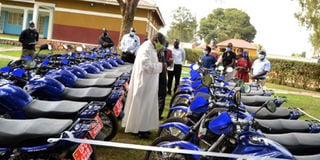FAO rolls out Shs1.4b climate change project

Kasana-Luweero Diocese Bishop Paul Ssemogerere blesses 18 motorcycles donated by FAO for the climate change resilience project at the diocesan offices in Luweero District last Friday. PHOTO/DAN WANDERA
The Food and Agriculture Organisation, (FAO) in partnership with Kasana-Luweero Diocese, have rolled out a climate change resilience programme targeting the integration of crop growing and pastoralism.
The programme will benefit 6,000 cattle rearing households in Nakaseke and Luweero districts.
The project worth Shs1.4billion under the Global Climate Change Alliance (GCCA) and the Global Environment Facility (GEF) comes at a time when parts of the cattle corridor areas of Nakaseke and Luweero are experiencing adverse effects of tree cutting and bush clearing for charcoal production.
Under the project, benefiting communities will be trained in ecosystem adaptation and mitigation, and the diocese will also establish functional watershed management systems.
In Nakaseke District, the project will be concentrated in the sub-counties of Wakyato, Ngoma, Kinyogoga, Kinoni and Kikamulo where eight micro water sheds will be rehabilitated, 225 hectares of drought-tolerant fodder plantations planted and 80 people trained in making energy saving cook stoves, among other activities.
In Luweero, it will cover Butuntumula, Kamira and Kikyusa sub-counties.
“A good management practice for the watershed areas through establishment of functional watershed management associations is paramount for areas that are already water stressed and face harsh weather conditions,” Rev Fr Hillary Meheezangango, the director of Caritas at Kasana –Luweero Diocese, said during the launch of the project at the weekend. Caritas is a development organisation of the Catholic Church in Uganda.
“The projects target the involvement of the community leaders, including village councils and technical teams, to achieve a sustainability status for the different community projects where at least 5,520 community members in selected micro watershed areas are direct beneficiaries.
At least 50 per cent of the beneficiaries will be women directly involved in the core production chain,” he added.
Kasana –Luweero Diocese Bishop Paul Ssemogerere explained that the forest cover in many parts of the Greater Luweero districts has been depleted, attracting unfavourable climate conditions.
“Our duty as partners and the communities is to harness team work as we explore the climate change resilience adaptation and mitigation measures. In line with this new project, we appeal for an enabling environment from both the government and communities,” Bishop Ssemogerere said.
Nakaseke District leaders welcomed the project. “Such deliberate projects should be accompanied by mass sensitisation on the need to plant more trees and protect the vegetation cover,” Mr Enoch Nyongore, the Member of Parliament-elect for Nakaseke North constituency, said.
Mr Nyongore said the sub-counties of Kinoni, Ngoma, Wakyato and Kinyogoga have been affected most by depletion of forest cover.
“The former wetland areas in many of these areas are a bee hive of activities, which don’t have environment mitigation components. It should be a standard that trees are planted in areas where the vegetation is being cleared.
We also need to secure more water sources through valley dam construction and train the communities on the water harvesting culture. We welcome the Church and FAO initiative on climate change resilience adaptation strategies,” he added.
In Luweero District, Mr Livingstone Kategaya, the former chairperson of Kamira Sub-county, acknowledged that household income generation projects should be accompanied with environment awareness campaigns.
“We believe the training of communities on the use of energy saving cook stoves and rehabilitation of the degraded watersheds is a welcome idea,” Mr Kategaya said.




